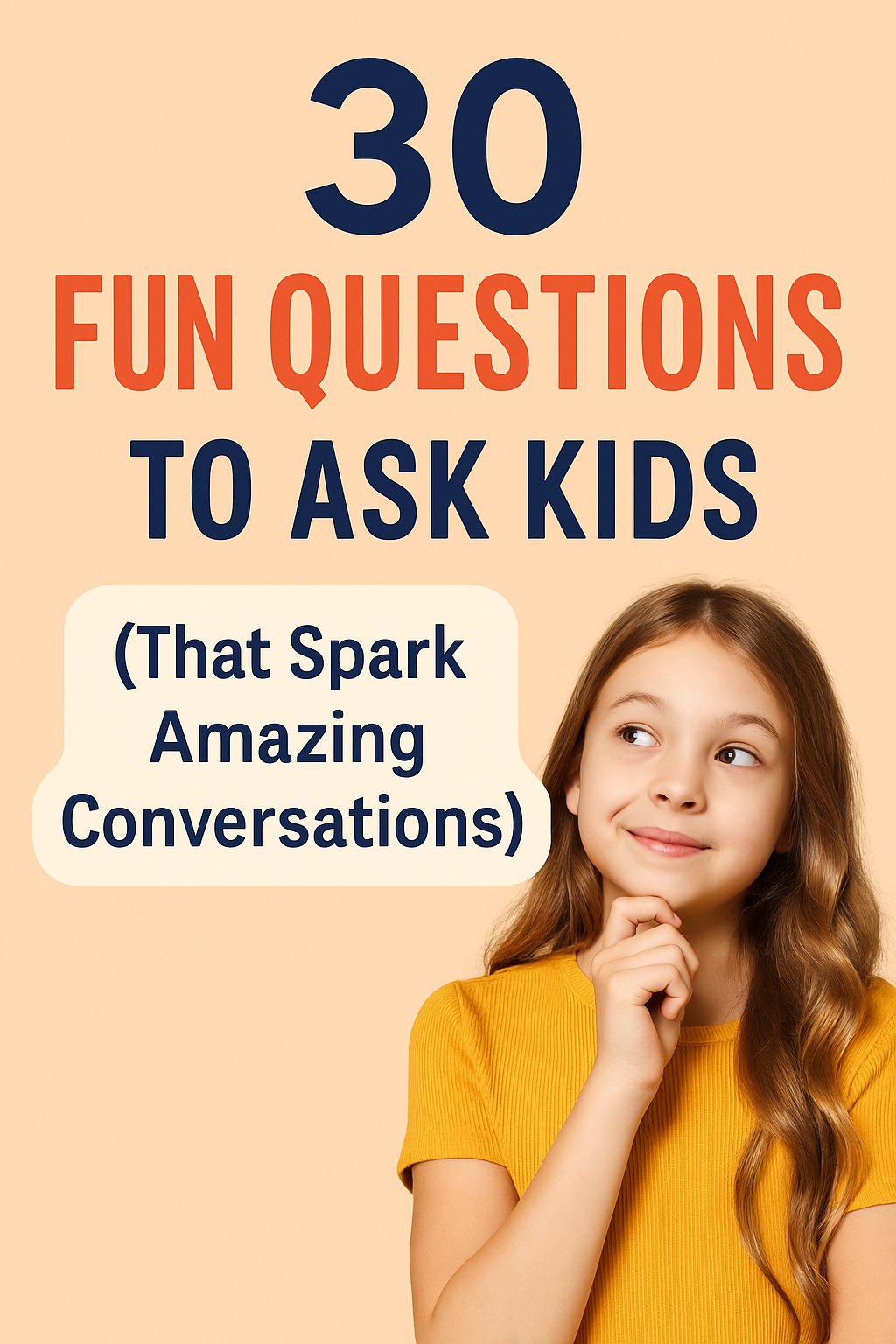30 Fun Questions to Ask Kids (That Spark Amazing Conversations!)
Ever struggle to pull more than a “fine” out of your kid after school?
If you’re nodding, you’re not alone.
One of the easiest (and most fun) ways to truly connect with children is by asking creative, playful, and thoughtful questions — ones that make them laugh, imagine, and share what’s really on their mind.
This giant list of fun questions to ask kids is perfect for dinner chats, car rides, bedtime talks, or anytime you want to deepen your bond.
(You might be surprised at how wild, hilarious, or insightful their answers are!)
Heads up: This post may include affiliate links. As an Amazon Associate, I earn from qualifying purchases—at no extra cost to you. Full privacy policy and disclosure here.
Why Asking Kids Questions Matters
Conversations aren’t just small talk — they build connection, trust, and emotional intelligence.
Research shows that kids who engage in regular, open-ended conversations with parents or caregivers often develop better problem-solving skills and stronger self-esteem.
👉 You might also love these ideas for sharing activities that boost connection with kids if you’re looking for even more bonding opportunities!
Tips for Asking Kids Fun Questions
- Keep it playful — no pressure to “answer correctly.”
- Be patient — give them time to think and imagine.
- Share your own answers too — it makes it feel like a two-way chat!
- Use funny voices or props to make it extra silly if needed.
30 Fun Questions to Ask Kids
🧠 Imagination Starters
- If you could invent a brand-new holiday, what would it be called?
- What would happen if you woke up with superpowers tomorrow?
- If animals could talk, which one would be the funniest?
- What would your dream treehouse look like?
- If you could fly anywhere right now, where would you go?
🍕 Food and Favorites
- What’s the weirdest food you’ve ever tried?
- If you could only eat one dessert for a whole year, what would it be?
- What’s your favorite smell in the world?
- Would you rather have pizza or cake for breakfast every day?
- What’s one food you think aliens would think is weird?
🌈 Silly Would-You-Rathers
- Would you rather have rainbow-colored hair or a tail?
- Would you rather live in a treehouse or a castle?
- Would you rather be able to talk to animals or swim like a mermaid?
- Would you rather slide down rainbows or jump on clouds?
- Would you rather have spaghetti for hair or pancakes for hands?
🧸 Feelings and Dreams
- What makes you feel super brave?
- What’s something you’re really proud of?
- What’s the nicest thing someone ever said to you?
- What do you want to be when you grow up?
- If you could make one wish right now, what would it be?
🚀 Adventure and Exploration
- If you found a treasure map, what’s the first thing you would do?
- What would your dream spaceship look like?
- If you could visit any planet, which one would you choose?
- Would you rather explore a jungle, an ocean, or outer space?
- What’s the coolest place you’ve ever visited?
Pro Tip:
Want even more ways to strengthen your parent-child bond?
Check out how sports can create unbreakable bonds with your child — it’s a fun and powerful way to build lifelong memories!
Fun Ways to Use These Questions
- Create a “Question Jar”: Write each question on a slip of paper and pull one at random during dinner or family night.
- Long Car Rides: Keep a few questions ready to turn boring drives into hilarious conversations.
- Bedtime Chats: End the day with a fun (or heartfelt) question.
If you love family adventures, you might also like these 20 fun dad and daughter outings that build lifelong bonds.
FAQ About Fun Questions to Ask Kids
What ages are these questions good for?
These questions are ideal for kids ages 4–12, but with a little tweaking, even teens and tweens enjoy them!
How often should I ask my child these kinds of questions?
You can sprinkle them into everyday life — at dinner, in the car, before bedtime. Aim for a few a week to keep it light and fun.
What if my child is shy or gives very short answers?
Start with silly, low-pressure questions and be patient. Sometimes it helps if you answer first to model how it’s done.
Can I use these questions during family photoshoots?
Yes! Asking funny questions is a genius way to get real smiles. Check out these 45 creative mother-daughter photoshoot ideas if you want to capture the magic!
What’s a fun twist to make it into a game?
Try a “Would You Rather?” championship or “Guess What I’m Thinking” spinoffs. Kids LOVE turning questions into games!
Helpful Resources for Parents
👉 Need more connection ideas? Check out activities that boost bonding between fathers and teenage daughters.
👉 Love question games? Grab this pack of “Would You Rather?” cards on Amazon — perfect for road trips, sleepovers, and family game nights!
Final Thoughts
Asking fun questions isn’t just about having a good time (though you definitely will!).
It’s one of the easiest ways to build trust, confidence, creativity, and deep bonds with your kids — all while laughing and learning together.
So pick a question tonight, see where the conversation leads, and get ready to discover a side of your child you may have never seen before!
Download Your Free Printable!
✨ Grab your copy of the 30 Fun Questions to Ask Kids printable and keep the conversation flowing — at dinner, in the car, or before bedtime!
✨ Save this list of fun questions to ask kids and spark amazing conversations anytime — perfect for family dinners, car rides, and bedtime chats! 📌 Tap to read and start connecting with your kids today!

